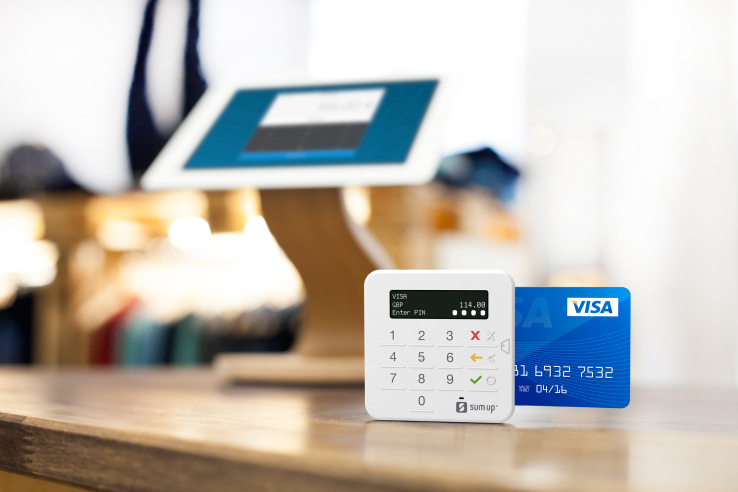
SumUp and Payleven merge as European ‘Square clones’ consolidate
By Ingrid Lunden for Techcrunch.com
Some consolidation afoot in the world of mobile payments: today Groupon- and BBVA-backed SumUp and Rocket Internet’s Payleven — two of the several European startups that cropped up in the wake of Square with their own smartphone accessories to make debit and credit card transactions — have announced that they are merging, creating a business with 1 million customers in 15 countries.
The two companies — both founded by Berliners and both based out of London — are not putting a price on the deal of any kind, in keeping with how both have declined to talk about valuations and sometimes the size of funding rounds in years past.
Both companies will continue all services with existing customers as before. Past investors are all also coming in behind the merged company as part of the deal. SumUp is thought to have raised just under $45 million (again, prices are not always made public), and Payleven raised just over $25 million. Investors include Rocket Internet, Holtzbrinck, NEA, BBVA, Groupon and many more.
The deal is being described as a merger by the two, but actually SumUp is getting the upper position in the deal: Daniel Klein, a founder of SumUp who was its CEO, will become CEO of the collective company, which will keep the SumUp brand.
The merger comes at a key time for the mobile payments space.
Four years ago, interest in mobile payments solutions based on the Square model hit something of a fever pitch. Square itself was inking landmark deals with the likes of Starbucks and ratcheting up its valuation, and PayPal, Verifone, Amazon and others moved into the space. And, in the absence of any European launch for Square or the rest, a number of startups over here were cropping up to fill the void, also picking up serious investors to scale their growth. That included companies like iZettle, as well as SumUp, Payleven and mPowa.
But fast forward to today and things are very different indeed. With the margins on these card transactions very thin, the returns are not huge for these startups, and they need a lot of scale to work.
When Square, the biggest of all of them, went public in November 2015, its valuation was far below the $6 billion price that investors had put in at when it was still a startup (and it’s still below $6 billion today). Several other payment hopefuls have shut up shop, with some crashing and burning in the process.
And crucially, the size of the market was not as big as everyone thought it would be.
Although there truly are tens of millions of merchants and small businesses that have yet to take card payments because of the fees for traditional services were too cost prohibitive for companies of that size, that didn’t directly correlate to all those SMBs signing up once they had the chance to pay lower rates with these startups.
“In Europe we discovered that it just takes a lot longer to adopt card payments at this scale than people originally thought it would,” Klein explained in an interview. Earlier, there were projections that by now we would have some 25 million SMBs using dongle-based card payment services, but in reality there are only around 8 million today, Klein said.
In that context, two of the startups in this space coming together makes some sense: it gives them more economies of scale on the thinner margin business, for starters.
But in addition to that, there are some synergies between the companies that gives more weight to a merger between them specifically. Not only do both have DNA in Berlin and are now based in London, but they have some common ground in their investors: another e-commerce clone created by Rocket Internet eventually became the basis of Groupon’s European business. Klein told me he started talking to Payleven execs about merging eight months ago.
“Even though we are similar in the business that we offer, we have complementary strengths,” Klein said. “SumUp is stronger in tech, which Payleven brings Rocket-style customer acquisition power that is unparalleled.” Tellingly, a Payleven founder will take the job of CMO.
The former refers to developments like the APIs that SumUp has been building to take its service into more apps to grow business; the latter refers to a well-know aggressiveness of sales teams for which Rocket Internet is (in)famous, although that tune seems to have changed in recent years.
For Rocket, this is another example of how the company is looking to straighten and simplify its business more. The company at one point had dozens and dozens of smaller e-commerce plays under development globally, but more recently they have startedconsolidating similar operations, sometimes with competitors, and in some cases closing things down that have no island to swim to or are just not swimming well enough.
Indeed, just today, Rocket announced that one of these businesses, the Global Fashion Group, would be raising another €300 million — but at a valuation that is more than two-thirds lower than its previous round: $1.1 billion today versus $3.5 billion a year ago.
Although Payleven had some interesting opportunities to potentially run as the payment mechanism for a number of Rocket’s businesses, that never really came to pass, although Klein says there is still (and even perhaps more) of an opportunity to do that now.
“SumUp and Payleven have decided to seize an exceptional opportunity: Two complimentary teams sharing the same vision joining forces. We can’t wait to put our full commercial power and experience behind distributing SumUp’s unique mobile payment technology on a global scale,” said Konstantin Wolff, co-founder of payleven and now CMO of SumUp in a statement. “With our shared know-how of the mobile payment space, we look forward to continue exceeding customer and partner expectations alike worldwide.“
First appeared at Techcrunch.com





